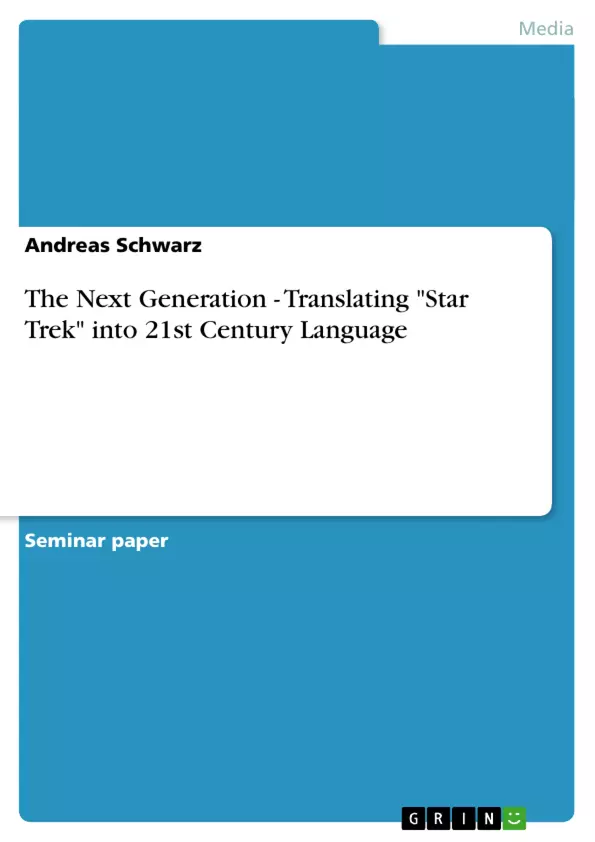The Original Series (hereafter TOS) of Star Trek, created by Gene Roddenberry, has been around for a whopping 43 years now. Despite a lack of initial success, TOS had four other series following it as well as now eleven feature films. TOS was the corner stone of the Star Trek universe. The interest behind this paper is the political and ideological subtext of Star Trek in 2009, as well as the commercial grounds behind it. Wasn’t Star Trek dead after Kirk died and fewer and fewer people watched the adventures of Capt. Picard’s crew on the big screen3? What makes this American utopian science fiction so appealing to audiences throughout the world? Why is it necessary to adapt and reinvent a brand from the sixties? How did they do it and what changed the original vision and concept from Gene Roddenberry over time? Star Trek has always incorporated traditional American key conceptual values and myths. How does that translate into the 21st century? How can audiences, new to the concept of Star Trek, relate to it while at the same time getting the entire exposition needed to emotionally partake in this universe?
To answer at least some of these questions, I will give a short summary on the history of the franchise and narrative, as well as the mythological and genre implications. Later the plot of Star Trek will be laid out briefly as I analyze, in a more detailed manner, several aspects and narrative devices of the film in regard to its 1960s predecessor. Unfortunately the analysis of the new Star Trek movie will have to be without the original script written by Robert Orci and Alex Kurtzman, which is still not available, neither online nor elsewhere. Apart from that, it can be stated that the film was crafted very much after the final script version since the WGA went on strike right after the script was finished in early November 2007 and director J.J. Abrams, as a member of the WGA, was not allowed to alter anything in the script during filming. However, I hope that through analyzing and comparing the “old” and “new” Star Trek universe, I can offer considerable insight into what is behind the legendary narrative of Star Trek, aside from Hollywood’s lust for dollars and action-packed blockbusters.
Inhaltsverzeichnis (Table of Contents)
- The Next Generation
- The Original Series - Rise of the Franchise
- Politics in Space
- The external conflict
- The internal conflict
Zielsetzung und Themenschwerpunkte (Objectives and Key Themes)
This research paper analyzes the political and ideological subtext of Star Trek (2009), examining its commercial success and enduring appeal. It explores how the series adapted and reinvented its original vision from the 1960s to resonate with 21st-century audiences. The paper also investigates the translation of traditional American values and myths into a contemporary context.
- The evolution of Star Trek's narrative and mythology across different series and films.
- The political and ideological subtext of Star Trek, reflecting Cold War anxieties and the Civil Rights Movement.
- The interplay between the "purist" and "universalist" approaches to science fiction within Star Trek's narrative.
- The depiction of a utopian future society and its connection to American ideals and myths.
- The adaptation and reinvention of the Star Trek franchise for modern audiences.
Zusammenfassung der Kapitel (Chapter Summaries)
The Next Generation: This chapter introduces the research paper's central questions regarding Star Trek's longevity and its appeal to audiences across time and cultures. It briefly touches upon the historical context of the franchise and its evolution.
The Original Series - Rise of the Franchise: This section provides a concise overview of the origins of Star Trek, defining science fiction genre traditions and classifying Star Trek within that framework. It highlights the series' unique blend of scientific plausibility and universal themes concerning the human condition.
Politics in Space: This chapter delves into the political and social commentary embedded within Star Trek: The Original Series (TOS). It examines both external conflicts, drawing parallels between the UFP and the "Free World" during the Cold War, and internal conflicts, focusing on the diverse crew of the Enterprise as a microcosm of society.
Schlüsselwörter (Keywords)
Star Trek, science fiction, utopian society, American mythology, Cold War, Civil Rights Movement, political subtext, ideological themes, franchise adaptation, inter-cultural communication, narrative analysis.
Frequently Asked Questions
What is the central focus of this research on Star Trek?
The paper analyzes the political and ideological subtext of Star Trek (specifically the 2009 film), exploring how the franchise reinvents its 1960s concepts for the 21st century.
How does Star Trek reflect historical political contexts?
The Original Series is noted for reflecting Cold War anxieties and the Civil Rights Movement, using the diverse crew of the Enterprise as a microcosm of an idealized society.
Why was the Star Trek franchise adapted for modern audiences?
Adaptation was necessary to translate traditional American values and myths into a contemporary context that new audiences can relate to while maintaining the core utopian vision.
What role did the 2007 WGA strike play in the 2009 film?
Because of the strike, director J.J. Abrams was not allowed to alter the script during filming, meaning the final movie stayed very close to the original screenplay by Orci and Kurtzman.
What makes Star Trek's utopian future appealing worldwide?
The appeal lies in its blend of scientific plausibility and universal themes regarding the human condition, combined with the depiction of a future society based on inclusion and exploration.
- Arbeit zitieren
- Andreas Schwarz (Autor:in), 2009, The Next Generation - Translating "Star Trek" into 21st Century Language, München, GRIN Verlag, https://www.grin.com/document/187086



